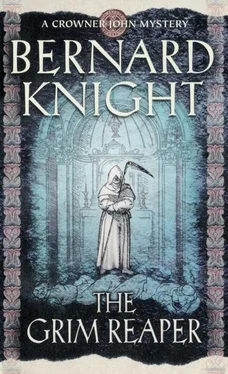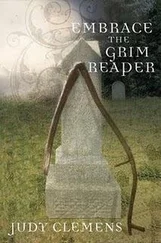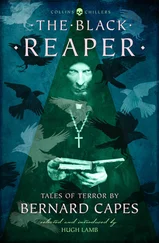Bernard Knight - The Grim Reaper
Здесь есть возможность читать онлайн «Bernard Knight - The Grim Reaper» весь текст электронной книги совершенно бесплатно (целиком полную версию без сокращений). В некоторых случаях можно слушать аудио, скачать через торрент в формате fb2 и присутствует краткое содержание. Год выпуска: 2002, ISBN: 2002, Издательство: Simon and Schuster, Жанр: Исторический детектив, на английском языке. Описание произведения, (предисловие) а так же отзывы посетителей доступны на портале библиотеки ЛибКат.
- Название:The Grim Reaper
- Автор:
- Издательство:Simon and Schuster
- Жанр:
- Год:2002
- ISBN:9780671029678
- Рейтинг книги:5 / 5. Голосов: 1
-
Избранное:Добавить в избранное
- Отзывы:
-
Ваша оценка:
- 100
- 1
- 2
- 3
- 4
- 5
The Grim Reaper: краткое содержание, описание и аннотация
Предлагаем к чтению аннотацию, описание, краткое содержание или предисловие (зависит от того, что написал сам автор книги «The Grim Reaper»). Если вы не нашли необходимую информацию о книге — напишите в комментариях, мы постараемся отыскать её.
The Grim Reaper — читать онлайн бесплатно полную книгу (весь текст) целиком
Ниже представлен текст книги, разбитый по страницам. Система сохранения места последней прочитанной страницы, позволяет с удобством читать онлайн бесплатно книгу «The Grim Reaper», без необходимости каждый раз заново искать на чём Вы остановились. Поставьте закладку, и сможете в любой момент перейти на страницу, на которой закончили чтение.
Интервал:
Закладка:
The sheriff managed to look supremely uninterested. ‘Never heard of him,’ he said. ‘Why are you telling me this?’
‘Because I think a priest killed him. And the death was on cathedral property.’
Richard de Revelle scowled and tapped his fingers on the table in irritation. ‘Then surely this is a matter for the bishop or his Chapter,’ he snapped impatiently.
De Wolfe shook his head. ‘In matters of murder and violence, you know well enough that Henry Marshal has handed his jurisdiction to us,’ he said evenly. He explained about the biblical text and the fact that someone who could read and write must have been the culprit.
His brother-in-law frowned and pointedly picked up a parchment roll. ‘Then you must look for a mad priest, John,’ he said offhandedly. ‘Was there no hue and cry raised?’
‘What was the point? His body was found almost stone cold this morning so it happened during the night.’
‘The bishop has his proctors patrolling the precinct and the Portreeves have their constables on the streets. What do you expect me to do about it? I thought you and your inquests were meant to ferret out these matters,’ de Revelle snapped.
The coroner sighed again and got up to leave. He could see that his brother-in-law had not the slightest interest in this particular item of law-enforcement, for which the sheriff was ultimately responsible in every county. He made one last effort as he made for the door. ‘This is no ordinary killing, Richard. A priest must surely be involved and I feel in my bones that we haven’t heard the last of him.’
De Revelle looked up at him, his cold eyes signalling his dislike. ‘John, if it’s a mad priest you’re seeking, you needn’t look further than your own clerk. I hear he tried to kill himself the other day, but maybe he’s turned his attention to others.’
De Wolfe growled in his throat and slammed the door as he went out.
CHAPTER THREE
De Wolfe had instructed Gwyn earlier to round up all those involved in the discovery of the moneylender’s body and have them at the Shire Hall in Rougemont by the tenth hour of the morning.
He arrived at the bare stone building as the distant cathedral bell was tolling for High Mass, the sixth of the nine daily services. The hall was the venue for the sheriff’s fortnightly County Court and would also house the long-awaited Eyre of Assize and General Eyre the following week. John used it for most inquests in the city: desolate though it was, at least it provided a roof over his head. A n open archway led into a large barren chamber, with an earth floor and a knee-high wooden platform at one end, with trestle tables, stools and a high-backed chair favoured by the sheriff. De Wolfe hoped that de Revelle and the castle constable, Ralph Morin, would make some effort before next week to improve the place for the King’s Justices. However, it was adequate for the brief inquest that he was obliged to hold on the moneylender.
As he arrived, Gwyn was marshalling a score of men in front of the platform, cursing good-naturedly and pushing them into a ragged line. These were the jury, dragged reluctantly from their daily work in Southgate Street. As John climbed on to the dais and sat down, he saw that the fletcher who had found the body and the Saxon constable were present, along with a couple more faces he recognised as having been at the scene of the death. Thomas de Peyne was seated at a table, already pulling out his ink, pens and parchments.
De Wolfe yawned as he waited for Gwyn to get organised — he had been roused from his bed earlier than usual and was beginning to feel the effects. As the gingery giant harassed the motley crowd into some sort of order, a garrison soldier arrived with a small handcart, on which a long shape was covered with a coarse cloth. The man wheeled it into the hall and left it immediately below the coroner, where he sat in the centre of the platform. ‘Here’s the corpse, Crowner. I was told to bring him from our cart-shed.’
De Wolfe nodded and the man-at-arms left, passing a rather dandified figure in the archway. De Wolfe was surprised to see that the newcomer was Hugh de Relaga, one of Exeter’s two Portreeves, the leaders of the city burgesses. Some cities were now electing mayors, but although there was talk of it, Exeter had not done so yet. The short, rotund merchant strutted to the platform and hauled himself up to sit on a stool alongside the coroner.
‘What brings you here, Hugh?’ asked John, with one of his rare grins. ‘You should be in your counting house, increasing our fortune.’ He and the Portreeve had a wool-exporting business with a warehouse on the quayside. De Wolfe played no part in the trading, but had invested in it much of the loot he had accumulated in foreign campaigns, and the burgess’s skill in buying and selling made them both a comfortable profit each year.
The fat little merchant was puffing with the exertion of hurrying up to the castle and produced a yellow silk kerchief to mop his brow. ‘I heard about Aaron’s murder from our constable. He lent money to a number of tradesmen in the city, including one or two burgesses, I suspect.’
De Wolfe looked down at him from his chair. ‘I doubt he was killed because of any money transactions, Hugh. He certainly wasn’t robbed.’
De Relaga, resplendent even at mid-morning in a scarlet tunic and a blue mantle, with a close fitting helmet of red silk tied under his chin with tapes, dabbed at his face. ‘Thank God for that, John. I was afraid that some debtor had decided to cancel the loan by beating him to death.’
By now, Gwyn was yelling for silence and when the jurymen and witnesses had quietened down, he yelled out the Royal Summons in a voice that sent the starlings flapping from the roof-beams: ‘Anyone having anything to do before the King’s coroner for the county of Devon touching the death of Aaron of Salisbury, draw near and give your attendance!’
The jurymen shuffled uncomfortably, raising dust which danced in the shafts of bright sunlight that struck through the archway. De Wolfe leaned forward, like some great black bird about to strike with the long beak of his nose. ‘Let the First Finder step forward.’
The small man who had visited the Jew early that morning was prodded by Gwyn to stand alongside the death cart, just beneath the forbidding figure of the coroner. He confirmed that he was Rufus Fletcher, and when Gwyn lifted the cloth over the cadaver’s face, he identified the dead man as Aaron of Salisbury. Then he repeated the story he had told de Wolfe a few hours earlier. ‘… I knocked up the four nearest householders, then sent for the constable,’ he concluded virtuously. Here he paused to consider the safest course, then added, ‘We didn’t start a hue-and-cry, Crowner. It was pointless as the old fellow was as stiff as plank so he must have been dead for hours.’
This echoed what de Wolfe had told the sheriff, and after a few more questions, which produced nothing useful, the arrow-maker stepped back thankfully into the crowd, relieved that he hadn’t been amerced for some legal transgression, which had become so common at inquests as to be almost a routine form of taxation.
The coroner looked over his shoulder to check that Thomas de Peyne was keeping the record, then turned back to his captive audience. ‘As to presentment of Englishry, it is both impossible and unnecessary,’ he barked. ‘It is well known that the dead man was a Jew, which is sufficient for the law.’
Since the Conquest, anyone found dead was presumed to be a Norman and a heavy ‘murdrum’ fine imposed on the surrounding community as a penalty for assassinating one of the invaders. The process was fast becoming ridiculous, as it was well over a century since the Normans had seized England and it was increasingly difficult to define who was a Norman, rather than a Saxon or Celt. However, the fines were a lucrative source of income to the Crown and the only way they could be avoided was for the family of the deceased to swear before the coroner that he was English. De Wolfe took a fair, common-sense view of the issue, unlike some coroners who would do their utmost to extract the fine, especially if they could divert some of it into their own purse.
Читать дальшеИнтервал:
Закладка:
Похожие книги на «The Grim Reaper»
Представляем Вашему вниманию похожие книги на «The Grim Reaper» списком для выбора. Мы отобрали схожую по названию и смыслу литературу в надежде предоставить читателям больше вариантов отыскать новые, интересные, ещё непрочитанные произведения.
Обсуждение, отзывы о книге «The Grim Reaper» и просто собственные мнения читателей. Оставьте ваши комментарии, напишите, что Вы думаете о произведении, его смысле или главных героях. Укажите что конкретно понравилось, а что нет, и почему Вы так считаете.












